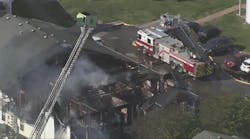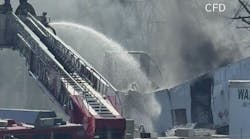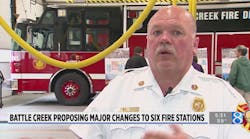A song from the faraway days of my youth urged us to "dream a little dream for me." How many of us had great dreams in our youth? I did. Perhaps you did too.
As keeper of the class records for the Combined Freehold Regional High School Class of 1965, I know that at least 35 of my classmates have gone on to their reward. They were people who had goals and dreams. Some died far too soon to make any progress toward their goals. Others were on the way, but then left us too soon. For the rest of us, the journey continues.
Think back to your days in high school. Think back to that joyous moment when you finally graduated. Did not the world seem to lay out in front of you like a vast, uncharted plain? That is the way I remember that time.
As a youngster, I hoped to be an Army officer. I wanted to follow my military service years with a stint in law school, then perhaps return home and practice law. It was a nice little dream that I created during my senior year in high school. It was the dream I took to Philadelphia, where I began my studies at the University of Pennsylvania.
Then a funny thing happened on the way to my future. I flunked out of Penn. This was not a good thing at the height of the Vietnam War. In fact, it was considered a one-way ticket to Vietnam. To me, it seemed as though a wooden stake had been driven through the heart of my neat little dream.
As I look back, that dream now seems strangely odd and unfulfilling. Did my failure stop me from dreaming? Not on your life.
From the moment I entered the recruiter's office in Asbury Park, NJ, in June 1966 until now, I have been privileged to live a life that has been almost dream-like. I wanted to become a fireman; I became a fireman (of course, later I became a firefighter). I wanted to be a fire chief; I became a fire chief. I wanted to be a college graduate; I did. My educational success has been beyond my parents' wildest dreams. I wanted to marry Jackie Miller of Adelphia; after years of hoping, dreaming and scheming, we were married. She and I wanted children; we have three great kids.
It's easy to skip over the hard work, road blocks, bad bosses, and other miscellaneous disappointments and setbacks I faced, but I got to where I am today because I set goals and created plans to reach them. I persevered in the face of controversy and pushed on when people told me that I could not. This too should be your plan.
I am a dreamer. I revel in this approach to life. I think there is a better world out there for our fire service, and I want to help us all reach that world. I suggest that you need to be a dreamer to succeed in this world. Let me suggest to you that if you are a leader, you need to create an organization of dreamers around you if your organization is to succeed.
According to the Reverend Scott Brown of the Colts Neck Reformed Church in New Jersey, five types of dreamers exist in our world. You need to understand them and learn to work with them. You need to nurture and cultivate them so that they can strengthen your organization.
Scott spoke of people who have no dreams. He suggested that they grew up without love and guidance. They were never taught that they could have dreams. There are people who have been so beaten down by the ways of the world that they feel that there is nothing at all for them to dream about. These people exist within your organization and you need to help them. Support, nurture and guide them. These folks may then become more productive. You should live a life that serves as an example of what hope and dreaming can bring. This is not easy, but it can be extremely rewarding.
Those in the next category have a low level of dreams. They usually live day to day and believe that they should not expect much out of life. This sort of behavior comes from experiencing disappointments early in life. They just stop setting high goals. This lets them avoid failure and live comfortably average lives. They get things, but not great things.
As a leader, it is critical to understand that you can help these people. You must learn to teach them to set their sights a little higher. You need to create a culture that allows for success to become a part of their lives. An effective leader can turn these marginal performers into team players, but you must make the first move.
Next are those who are working hard to live the wrong dream. They need some direction. These people put a first-class level of effort into what can best be described as a second-class dream. They pour their heart and soul into those things that land them in the middle of the pack when all is said and done. These were the people who sought to build the best buggy whips in the world at about the same time that Henry Ford was turning out his first Model T Ford.
You need to broaden their horizons. Be willing to provide constructive criticism. Let them try; if they fail, be there to help them pick themselves up and start over. But you need to make the first move.
Then there are those people who try to dream, but create vague and incomplete dreams. These people have a great deal of potential, but they need guidance to broaden and define their horizons. These people need to sit at the right hand of a knowledgeable veteran in their organization. These are the people who will respond best to the efforts of a sincere and dedicated mentor. The well-trained mentor can help them to channel their efforts toward a better quality of dreams.
Last are those among us who really are dreamers. They live within the same space as the rest of us. The go to the same places we do, they breathe the same air as us. Maybe they are even riding seated and belted right next to us in our fire trucks. These are the folks whose hearts and minds are always a beat or two ahead of the rest of us. They move quickly up and out of life's valleys, setting their sights high and searching for the next mountain to climb.
Why are dreamers like this? The only reason I can offer to you is that they grew to adulthood in the presence of people who showed them the importance of setting high goals. They learned to dream at the right hand of a real dreamer.
Perhaps there is that small minority of us who are born to be dreamers. I am not sure. However, I believe that most people who are dreamers learn how to dream from other people who have spent their lives dreaming. They learned to set goals and then work toward them. The joy of success then spurred them on to further dreaming.
It is my fervent belief that the best leaders are the dreamers among us. They are not afraid to ask the simple questions: What if and how about? More than that, they are patient enough to understand how difficult it is to bring others to their vision. They are persistent enough to see a goal through to its fruition.
Be warned. Those who dream always threaten those who do not dream. Don't let that stop you. Consider the words of the great German philosopher Johann von Goethe. He wrote, "Whatever you can do or dream you can do, begin it. Boldness has genius, power and magic. Begin it now."
I urge you to dream of what might be. Do not settle for what is. Do not allow yourself to become a "we've always done it that way" warrior. Set your eyes on the prize and then go for it.
HARRY R. CARTER, Ph.D., CFO, MIFireE, is a Firehouse® contributing editor. A municipal fire protection consultant based in Adelphia, NJ, he is the former president of the International Society of Fire Service Instructors. He is a past chief and active life member of the Adelphia Fire Company. Currently the chairman of the Board of Fire Commissioners for Howell Township District 2, he retired from the Newark, NJ, Fire Department in 1999 as a battalion commander. He also served as chief of training and commander of the Hazardous Materials Response Team. Dr. Carter is secretary of the United States Branch of the Institution of Fire Engineers of Great Britain (MIFireE). You can contact him through at [email protected].





